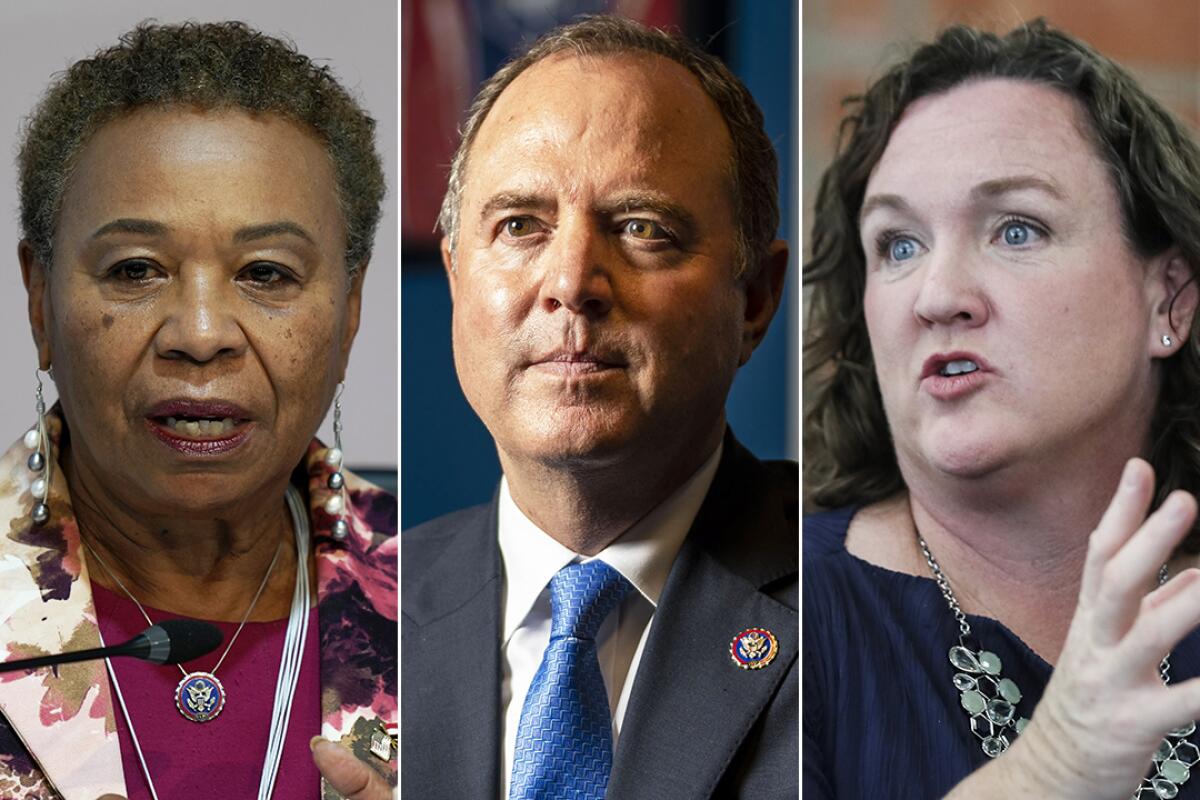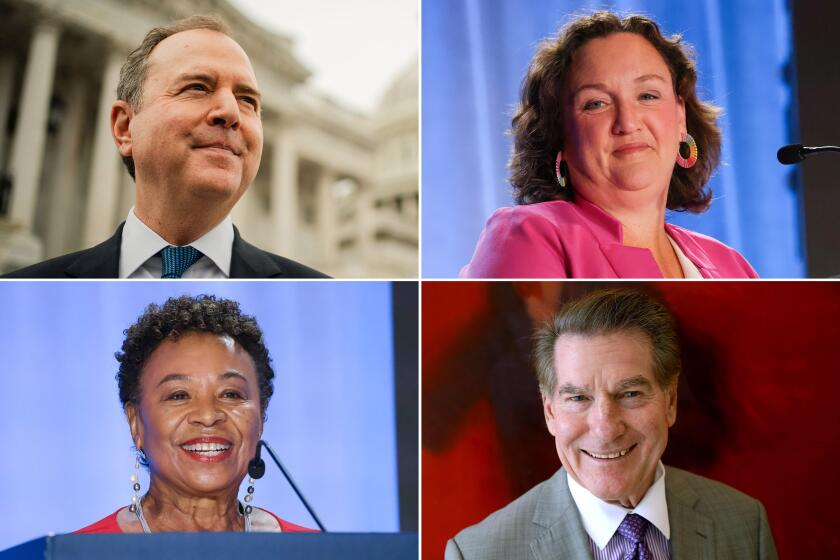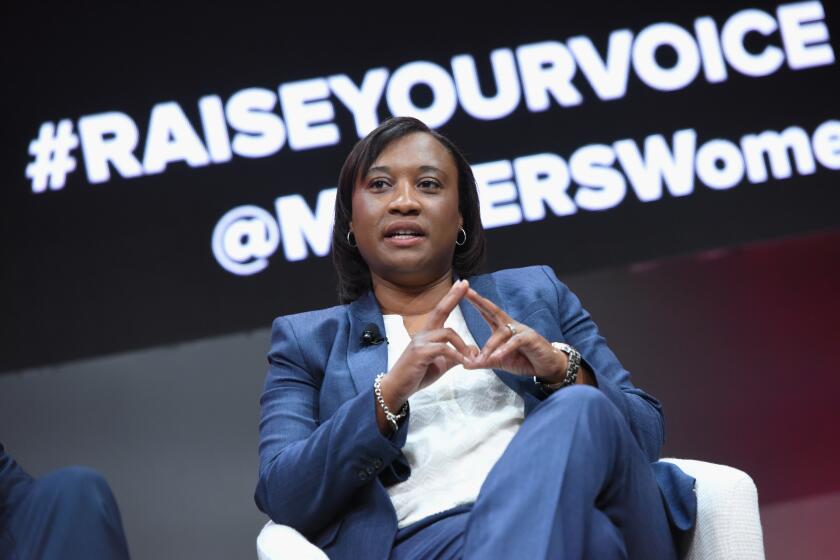Adam Schiff outpaces Barbara Lee, Katie Porter in fundraising for California Senate race

- Share via
In the race to replace the late Sen. Dianne Feinstein, Rep. Adam B. Schiff continues to hold a strong lead over his rivals in fundraising, bringing in nearly $6 million in campaign contributions in the last three months, according to federal reports released Sunday.
Rep. Katie Porter, an Irvine Democrat, raised more than $3.3 million in July, August and September and has brought in about $11 million since joining the race. Rep. Barbara Lee, a Democrat from Oakland, raised about $1 million in the third quarter and has brought in about $3.2 million overall, according to filings with the Federal Election Commission.
All three Democrats have raised far more than the Republican contenders for the Senate seat.
The March primary election is about five months away. Fundraising numbers are a hint at the viability of candidates running for a rare open Senate seat in California, home to some of the most expensive media markets in the nation. Airing an effective television advertising campaign, which can cost millions of dollars per week in the Los Angeles market alone, is essential for any statewide campaign courting the Golden State’s 22 million registered voters.
Sen. Dianne Feinstein had announced that she would not seek reelection before her death. Here are the announced and potential candidates for her seat.
“It’s super expensive to reach voters in California, including in areas where voters aren’t as familiar with you,” said Democratic strategist Bill Wong, who is not working for any of the Senate candidates. “Good, persuasive TV ads are going to be very expensive.”
Porter and Schiff, of Burbank, both have national profiles, he said, and “it’s possible that Democratic voters will be aware of them, but the question is: How do you persuade voters to choose? That’s going to take a lot of effort and money to differentiate them.”
Schiff and Porter are among the House’s most prodigious fundraisers. But Porter spent $29 million to defend her House seat in Orange County last year, while Schiff easily won reelection without having to put a major dent in the money he raised — cash he banked and can now use in the Senate campaign.
Schiff reported spending $4 million in the third quarter and ended the period with about $32 million in cash on hand. Porter’s campaign reported spending $1.8 million and has about $12 million in cash on hand.
Lee’s campaign reported more expenses than income in the last three months, with $1.1 million going out, about $77,000 less than she raised. The campaign has $1.3 million on hand, filings show.
“If she can’t raise enough money to reach all the other crossover voters to differentiate herself, it’s going to be very difficult for her to make it,” Wong said.
Lee’s burn rate — how quickly her campaign is spending the cash that comes in — is high, Wong said, a metric that campaigns watch closely. It could be a sign that her campaign realizes that she “has to spend early to build a fundraising base and to reach new donors” as she competes against Democrats with national profiles and more robust fundraising operations, Wong said.
With Gov. Newsom’s appointment of Laphonza Butler to temporarily fill Sen. Dianne Feinstein’s seat, the question becomes: Will Butler run for a full term in 2024?
How successfully the existing candidates are raising money may also be a factor in determining whether Laphonza Butler, Gov. Gavin Newsom’s appointee to Feinstein’s seat, will enter the race. Butler’s decision has the potential to significantly reshape the race.
“I genuinely don’t know,” Butler told The Times this month of whether she will run. “I want to be focused on honoring the legacy of Sen. Feinstein. I want to devote my time and energy to serving the people of California.”
The competition to replace Feinstein is further complicated by California’s “jungle” primary system. The two candidates who receive the most votes in the March 5 primary will advance to the Nov. 5, 2024, general election, regardless of political party.
If two Democrats secure the most votes in the primary, the election will most likely be competitive, and expensive, through November. If a Republican secures one of the top two spots, the Democrat they face will have a seemingly insurmountable advantage because of California’s progressive politics.
California last elected a Republican to statewide office in 2006 and has grown more liberal since then. As of February, the most recent data available from the secretary of state’s office, Democrats accounted for nearly half — 47% — of registered voters, Republicans for 24% and voters who did not express a party preference for 22%.
Silicon Valley executive Lexi Reese, a Democrat, reported raising about $712,000, of which she contributed about $250,000, filings show. The Reese campaign reported spending $655,000 and had about $682,500 cash on hand as of Sept. 30.
Republican attorney Eric Early reported raising $275,608 through Sept. 30. Republican James Bradley, a Coast Guard veteran and former healthcare executive, reported raising $11,437.
Republican former Dodgers All-Star Steve Garvey, who announced he would run last week, has not made any campaign finance disclosures.
More to Read
Get the L.A. Times Politics newsletter
Deeply reported insights into legislation, politics and policy from Sacramento, Washington and beyond. In your inbox twice per week.
You may occasionally receive promotional content from the Los Angeles Times.













